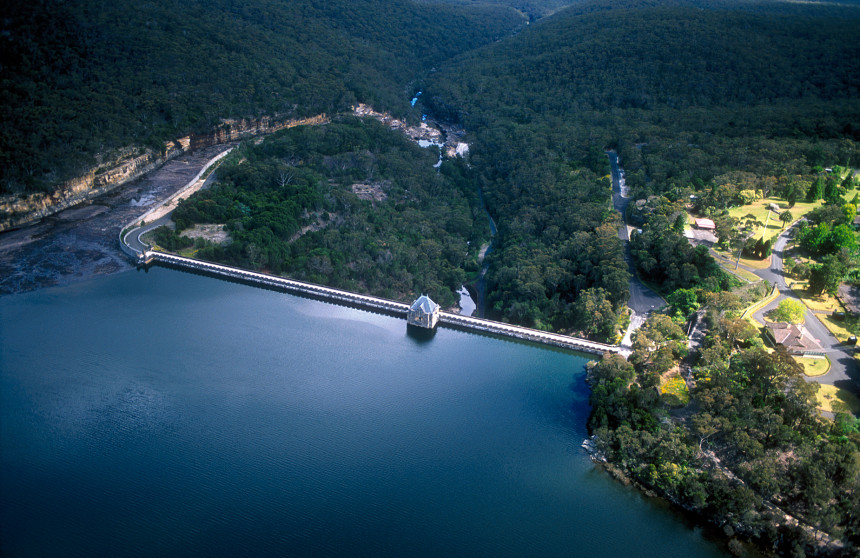New recommendations to improve Australia’s water management

Water security is one of the greatest issues facing Australia, and engineers have a significant role to play in helping to meet the challenge.
In a submission to the Productivity Commission’s Inquiry into progress on National Water Reform, Engineers Australia’s National Committee on Water Engineering (NCWE) called for better data to assist with water planning and management.
Coordinated by deputy chair Dr Brendan Berghout, ACT representative Associate Professor Katherine Daniell and Queensland representative Toby McGrath, the NCWE made 11 recommendations to the Commission based on its May 2020 Issues Paper.
“The availability of the glass of water you will drink tomorrow, and the day after that, is, at its core, based on water resources data,” McGrath told create.
He believes that the water engineering profession is acutely aware of limitations in the available data used in the development and implementation of plans that underpin water security for agricultural, domestic, industrial and environmental users throughout the country.
“Poor data collection and management systems mean that we can’t plan adequately for climate variability and change, we can’t properly evaluate environmental or cultural impacts, and we can’t evaluate in real time if users are complying with licence conditions,” he said.
Key recommendations
The submission took a 360-degree view of water management in Australia, highlighting the need to ensure better connections between planning agencies, enhanced monitoring and compliance activities, inclusion of Indigenous perspectives and increased support for regional and remote communities.
A summary of the 11 recommendations is as follows:
- Formally review water resource monitoring systems, the fundamental data networks on which we manage and assess Australia’s water systems, including applying a report card system for stream gauging stations.
- Strengthen National Water Initiative (NWI) requirements for water resource data systems, the interface with land use planning, and management of extreme events.
- Review water management practice in past emergencies and provisions for future emergencies.
- Review and update water accounting and compliance regulations, and consider real-time reporting of diversions against allocations.
- Invest in basic hydrological and ecohydrological research and the data that underpins them.
- Develop a broadscale co-design process as a foundation for engagement on Indigenous values and knowledge in planning national water futures.
- Review the regulations, guidelines and practices of water utilities during extreme conditions and when providing public benefits such as flood mitigation and fire-fighting water supply.
- Evaluate options to improve the capability of small water suppliers in remote areas.
- Break down impediments to water sensitive urban design/integrated water cycle management principles, along with merit-based evaluations of urban water projects post-implementation.
- Evaluate all water infrastructure projects on their merits, and a review process that evaluates the actual benefits and costs against the projections.
- Invite a member of EA’s NCWE to the Inquiry’s stakeholder working group.
Alongside across the board improvements to water data systems, McGrath emphasised the need for all options to be considered and to be evaluated on their merits.
“We need to include input from the engineering, environmental, economic, social and cultural fields, as well as considering both short-term and long-term, and direct and indirect, benefits and costs,” he said.
Meeting water challenges
With many Engineers Australia members having first-hand experience of major water reforms under the NWI to date, and the residual issues, the NCWE sought input on the Productivity Commission’s 12 information requests from its members, as well as members of Engineers Australia’s state-based Water Panels.
“POOR DATA COLLECTION AND MANAGEMENT SYSTEMS MEAN THAT WE CAN’T PLAN ADEQUATELY FOR CLIMATE VARIABILITY AND CHANGE.” Toby McGrath
The feedback was used to develop a draft, which was reviewed by NCWE and Water Panel members, before finalisation and submission.
NCWE deputy chair Dr Brendan Berghout said that the Inquiry was critical to public confidence in how Australia’s water resources are being managed.
“This process is especially important this year coming off the back of a severe drought, which stress tested the ability of water management frameworks to manage climate change and climate variability,” he said.
The Productivity Commission has already received some 90 submissions to its Inquiry. One from the Murray Darling Water Basin Authority warned that government policies “must evolve now” to meet the ambitious objectives of the National Water Initiative and reduce the consequences of future severe droughts.
Associate Professor Katherine Daniell said that this was also a key consideration for the Committee, which took a number of factors into account in producing its recommendations, including how water interacts with all aspects of the built and natural environments, as well as cultural, economic, and environmental concerns and the wellbeing of people who live in those environments.
“Recent floods, droughts and fires in Australia have reminded the world that we are on the front line of responding to climate change and they are watching how we manage intently,” she said.
“This is a big responsibility for Australia’s water engineering community.”
Read the full submission here.
Originally published by Create – Engineers Australia, 17 September 2020 (link)
